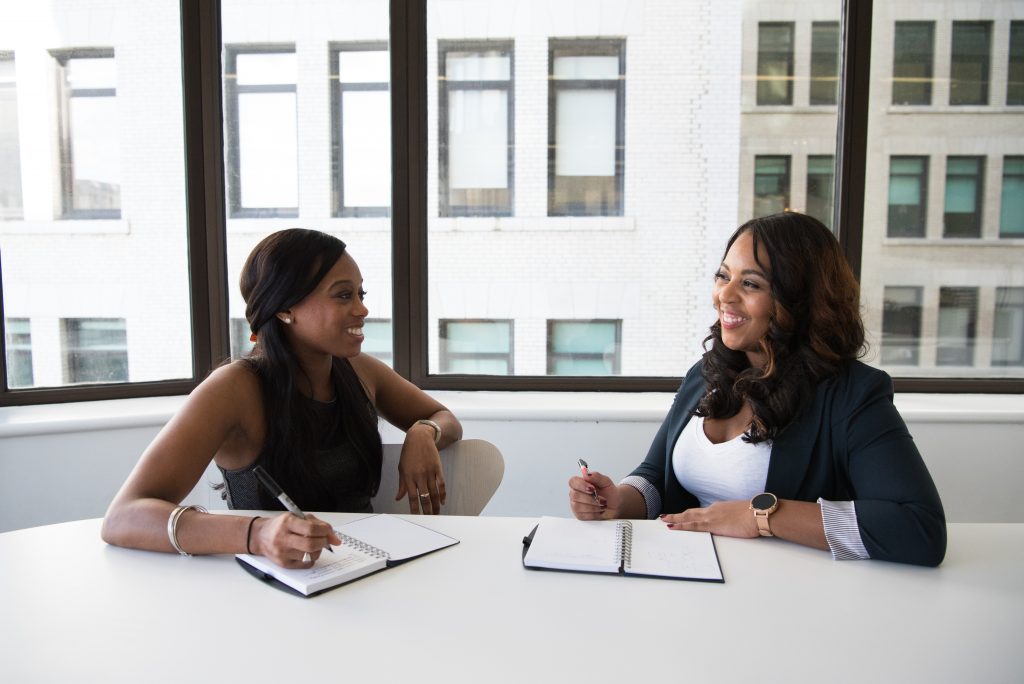Here’s a scenario: you have recently graduated college or university, and have spent the last few weeks scrolling through LinkedIn, Indeed and the Evenfields Job Board looking for the perfect first job. You have applied for so many jobs that you have now forgotten what roles you have heard back from until *insert phone notification* THAT email arrives in your inbox: you have been invited to your first interview. Does this sound like you? If so, scroll no longer! Continue reading for our infallible guide to successful interviews.

1. Do your research.
Going through a job interview can be a stressful experience as you want to make a good impression on your prospective employer and, ultimately, get the job. But it’s difficult to know exactly what will win over your interviewers.
A good way to be prepared is to make a list of common questions that employers in your industry usually ask so that you can prepare your answers and ensure that you answer all questions to the best of your ability.
For example, one of the most common interview questions is “What are your strengths and weaknesses?” To prepare for this question start by noting down your top three strengths and weaknesses, then think about how these relate to the job you are applying for.
Pro tip: don’t forget to recognise a weakness! And use this opportunity to let your prospective employer know how you are making improvements.
2. Practice your answers out loud.
Often, employers refer to scenario questions to assess your attitudes in the work environment, and although you may find these tricky, these questions are the perfect opportunity not only for your employer to see if you are the right fit for the team but also for you to see if that is the right job for you.
For these scenario questions, try to recall specific examples from your past that demonstrate your skills and/or experience. A good way to answer these questions is then to use these examples as anecdotes in your answers.
However, it is no good going through all of this research and preparation if you don’t practice verbally saying these answers out loud. Practicing your questions out loud not only gets your facial muscles used to talking for a long period of time (you would be surprised at how much time some answers can take!) but also allows you to practice your pronunciation and enunciation.
A great way to practice your answers out loud is with a family member or friend! Talking with somebody mimics the interview environment, and it is especially good as they can also provide you with immediate feedback. If this is not an option, you can always practice in front of a mirror or video yourself and your answers – you can always send your practice videos to your family or friends to get feedback.
Pro Tip: You should also make sure to come to the interview with two or three questions of your own. Asking thoughtful questions shows that you’re interested in the position, engaged in the conversation, and prepared for the interview. Don’t forget that interviews are a two-way street and they’re also an opportunity for you to find out if the job and the employer really are a good fit for you!
3. Suited and booted.
What you wear to an interview can be as important as how you answer any interview questions they may ask. Making an effort by dressing formally and professionally shows your prospective employer that you are out to impress. If you are unsure of what to wear, a suit and a blouse/shirt with nice shoes is usually a safe bet! However, this may vary according to the occupation and role you are applying for.
Our advice is that you focus on more conservative and muted colours such as black, navy, or grey – keep it simple! And it’s a good idea to also make sure you have an interview outfit ready – that it fits, is clean and ironed, and ready to go at a moment’s notice.
If you’re unsure of how formal the company is, you can always ask your recruiter or contact the company to find out what they suggest you wear.
4. Time is money.
Make sure to be on time, or even a little early. If possible, try to arrive at least 15 minutes early for your interview – but not any earlier, as this may be distracting to the hiring managers and employees around.
If you are familiar with the area the company is located in, plan your journey to ensure you show up on time. And if you are not, it is always a good idea to go on Google Maps to familiarise yourself with your journey.
5. Come prepared!
Bring copies of your CV and cover letter, even if you submitted them to your interviewer during the application process. You never know if their copy got lost or spoiled somehow. Bringing extra copies not only allows you to go through them together should that opportunity arise, but it will also make you look prepared for the interview.
It is also a good idea to bring a pen and notebook to make notes during your interview (should you wish to), and to also be able to refer back to the list of questions you want to ask the employer at the end of your interview.
Last but not least, don’t forget to be yourself!
The world of job interviews and work can be overwhelming at times. Evenfields Careers and Evenfields Community is a great place to start your career journey. Follow our social media pages for daily employability tips and advice, as well as our LinkedIn and Facebook groups (where you will be able to connect with hundreds of professionals from various fields in the UK). For more information and guidance, please check out our range of Black Careers Matter masterclasses, which cover networking, career planning, and lots more!
#successfulinterviews #careeradvice #careerdevelopment #interviewquestions
